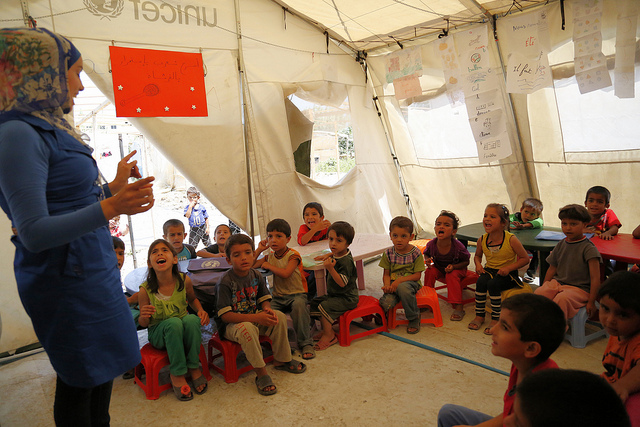Safe Schools: How Business Can Help

Photo Credit: Syrian refugee children attend a lesson in a UNICEF temporary classroom in northern Lebanon, July 2014, © DFID
Theirworld has released a major report outlining the instability and violence that children – especially girls – face as they seek to receive a quality education, which is undermining the United Nation’s Sustainable Development Goal of a equitable and inclusive quality education for all by 2030. In fact, by 2030, the report predicts that more than one in three children – over 600 million – will live in countries impacted by conflict, humanitarian emergency or high levels of violence.
The report, Safe Schools: The Hidden Crisis, highlights the scale of the challenge and puts forward a framework for action with concrete ways various stakeholders – from governments and international organizations to community groups, philanthropy, and business community – on how they can play a role in supporting safe schools and learning environments.
The report highlights four key advantages the business community has in supporting safe schools:
- Presence in local communities often experiencing need of safe schools and learning environments as employers or through direct interaction with consumers
- Employee talent, services and products, including new technology, which could support safe schools and learning environments
- Philanthropy, social responsibility, and community investment programs
- Influence from corporate leadership at national and global levels by interaction with consumers through marketing and advertising
In December 2015, UNICEF, the Global Business Coalition for Education (GBC-Education) and its partners launched an initiative for safe schools in Latin America, which shows how partnerships with government and NGOs on the ground can deliver education programs that re-engage students amid high violence. The initiative includes measures to prevent weapons in schools and develop conflict resolution in a region where 21 million children are out of school and gang violence is a major cause.
Launched after the kidnapping of 276 Chibok schoolgirls in 2014, the Safe Schools Initiative in Nigeria was a partnership of business leaders from the Global Business Coalition for Education, the UN Special Envoy for Global Education, A World at School and the Nigerian government, leveraging $30 million to promote safe schools. Working with UNICEF and UNDP, the government and international donors each matched the first catalytic investment of $10 million from the business community. Nearly displaced 50,000 children were directly helped by the Initiative through various interventions, including moving students to safer areas for study, equipping pilot schools with additional safety features and protocols, and supporting education and teacher training in host communities.
The report is full of examples of companies innovating at the global and local level to deliver safe schools and provides a variety of entry points to help prioritize, invest, and deliver safe schools for youth.
To read the Safe Schools report, follow the link here. The Global Business Coalition for Education is an initiative of Theirworld.
